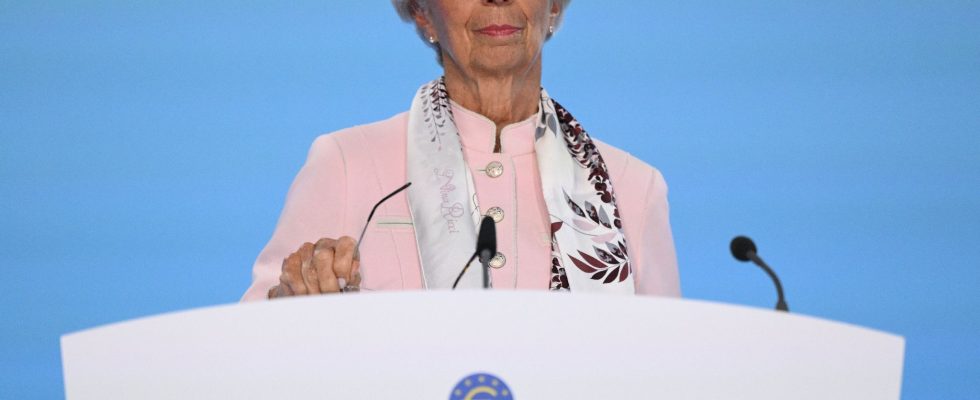There will not be an eleventh consecutive increase. As expected by most economists, the European Central Bank (ECB) announced, this Thursday, October 26, a pause in its monetary tightening policy, which began in July 2022. In the space of 15 months, the governing council had raised the ECB’s interest rates ten times to combat inflation. But today, there are many arguments in favor of a status quo on the side of Frankfurt.
Starting with the slowdown in price increases in the euro zone. In October, the annual inflation rate eased to 4.3% – from 5.2% in August – its lowest level in two years. “Things are moving in the right direction and ECB experts know very well that inflation has every chance of falling to 3%, or even below,” says economist Véronique Riches-Flores. To the point of reaching the 2% objective set by the monetary institution? Nothing is acquired. “We consider that the ECB’s interest rates are at levels which, if maintained for a sufficiently long period, will contribute substantially to the achievement of this objective,” declared its president, Christine Lagarde, during the traditional post-meeting press conference.
A heterogeneous transmission to the economy
In any case, you will have to wait. “Several studies go in the same direction to say that the transmission of monetary policy to the economy takes much longer now than a few years ago. Previously, the norm was nine to twelve months. Today “Today, we are more around 18 months,” points out economist Christopher Dembik, investment strategy advisor at Pictet AM. And this transmission turns out to be very unequal depending on the country. “We observed a much faster diffusion in Italy than in France. This heterogeneity is difficult for the ECB to manage,” observes Alexis Guillaume, doctoral student at Paris Dauphine-PSL University on monetary policies. In September, the one-year inflation rate still remained very high in Croatia (7.3%), Slovenia (7.1%) and Slovakia (8.9%), but also in Austria (5.8%). ).
The ECB is also following in the wake of its American counterpart. At the end of September, the Federal Reserve (Fed) announced a temporary halt to its rate hike cycle. “The ECB is often forced in the short or medium term to follow its decisions, in particular to ensure that the euro/dollar exchange rate does not deviate too much. Exchange rate variations could have effects on foreign investments, hence the desire to keep the currency stable”, explains Alexis Guillaume. The Fed should still opt for the status quo at its next meeting scheduled for October 31 and November 1.
In the meantime, the ECB Governing Council seems to be walking on eggshells. The European economy is slowing down and the shadow of a recession hangs over the eurozone more than ever. Added to this is now the uncertainty around the Israeli-Palestinian conflict. “All the indicators are very bright red. Until now, growth was maintained by the tertiary sector. Now, not only is industry floundering, but services are changing direction. We can no longer count on the “post-Covid catch-up effect”, estimates Véronique Riches-Flores.
The ecological transition could be delayed
Christine Lagarde’s restrictive policy therefore has a good influence on the economy, through long rates – those with a maturity of more than one year. On Monday, October 23, the yield on the benchmark 10-year US Treasury bond rose to 5%, the highest since 2007. In France and Germany, 10-year sovereign rates exceeded the 3% mark. . In Italy, they are flirting with 5%. A situation which is expected to persist, at the risk of affecting the financial stability of euro zone countries, with States borrowing on the bond market from banks and financial companies to “roll over their debt”.
A danger also for companies which see their investment capacity undermined. “The rise in long-term rates automatically increases the threat of borrower default. We face a risk of chain bankruptcies like with the Silicon Valley Bank,” warns Alexis Guillaume. And the situation is unlikely to improve, to the detriment of the ecological transition, which requires heavy investments financed, in particular, by bonds. “The ECB had announced a greening of its monetary policy, but the need to control inflation put this desire on hold. It is complicated to carry out everything at the same time,” according to the doctoral student. The next meeting of the institution is scheduled for December. But between geopolitical and economic uncertainty, the governors of Frankfurt will continue to advance on a ridge line.
.
